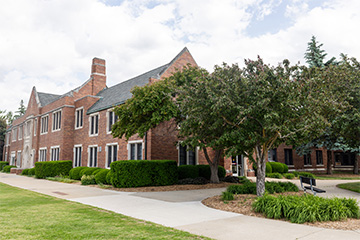The Philip L. Kintzele School of Accounting maintains separate accounting accreditation
Separate AACSB recognition places CMU among world’s top 2 percent of business schools
Fewer than 200 universities worldwide hold separate AACSB accreditation for their accounting programs. Central Michigan University’s The Philip L. Kintzele School of Accounting is one of them.
The school has maintained this distinction since 1989, complementing the college-wide AACSB recognition. This accounting and business accreditation places CMU among less than 2 percent of business schools globally and signals a high standard of excellence to students and employers alike.
A higher standard
Separate accreditation is not simply another credential. It requires departments to meet rigorous academic and professional criteria, including maintaining active faculty research and staying involved in the accounting profession.
According to the Association to Advance Collegiate Schools of Business (AACSB), schools seeking supplemental accounting accreditation must meet not only the nine business accreditation standards, but also an additional six that focus specifically on the discipline and profession of accounting. These include faculty qualifications, curriculum relevance, and connections to practice, ensuring that graduates are well-prepared for the evolving demands of the industry.
Connecting students with professionals
The school's engagement with industry professionals builds connections to practice through activities sponsored by the school and its student organization, Beta Alpha Psi. CMU’s chapter, supported by The Philip L. Kintzele School of Accounting, offers professional development, networking and service opportunities, and fulfills national expectations for student engagement.
Lori Olsen, chairperson of The Philip L. Kintzele School of Accounting, said these professional connections are a core strength. "The activities and engagement opportunities that we provide for our students to connect with professionals are truly among our greatest strengths," Olsen said.
Career outcomes and credibility
For students applying to graduate school or seeking employment, AACSB accreditation can make a critical difference. For students, AACSB accreditation translates into broader opportunities and greater credibility with employers and graduate schools.
"There are employers who look more strongly toward AACSB-accredited schools when they recruit students because of the signal it sends about program quality," Olsen said.
Focus on student readiness
The school demonstrates curriculum relevance through its Assurance of Learning Plan and focuses on student readiness for the profession, including faculty and student currency and agility in technology. The most recent review showed measurable improvement in student preparation, with employers rating students significantly higher in tech skills by the end of the review period.
Part of a college-wide commitment
Dean Chris Moberg said the accounting school’s accreditation strengthens CMU’s reputation for excellence. “When employers are looking at where they want to recruit students from, they’re going to want to go to places where they know the business education is good,” Moberg said.
Associate Dean Misty Bennett emphasized that accreditation also demonstrates a culture of continuous improvement. “They want to see that you have a plan in place, that you have continuous improvement processes in place,” she said.
Through strong leadership and industry-aligned education, The Philip L. Kintzele School of Accounting continues to prepare students for meaningful careers in a competitive global marketplace.




